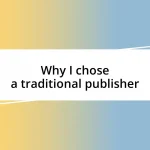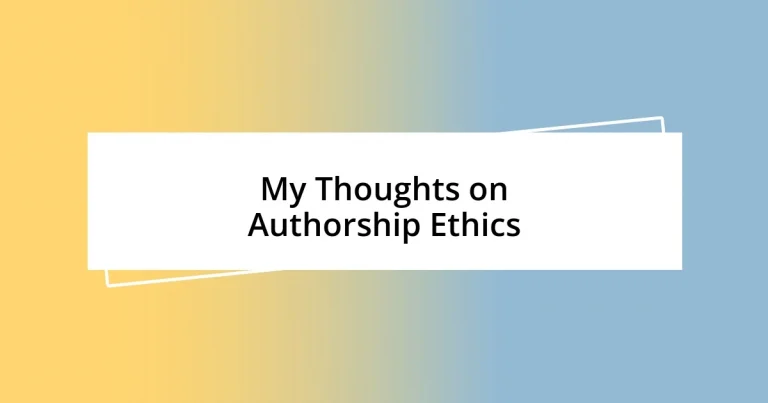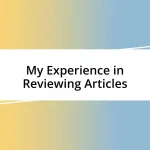Key takeaways:
- Understanding authorship ethics involves recognizing contributions, maintaining transparent communication, and grappling with issues like ghostwriting and authorship order.
- Proper attribution is crucial for acknowledging the work of others, fostering trust, and avoiding plagiarism, which can damage professional relationships and reputations.
- Establishing clear roles and guidelines at the outset of collaborative projects, practicing humility, and utilizing resources such as institutional ethics committees are essential for upholding ethical standards in authorship.
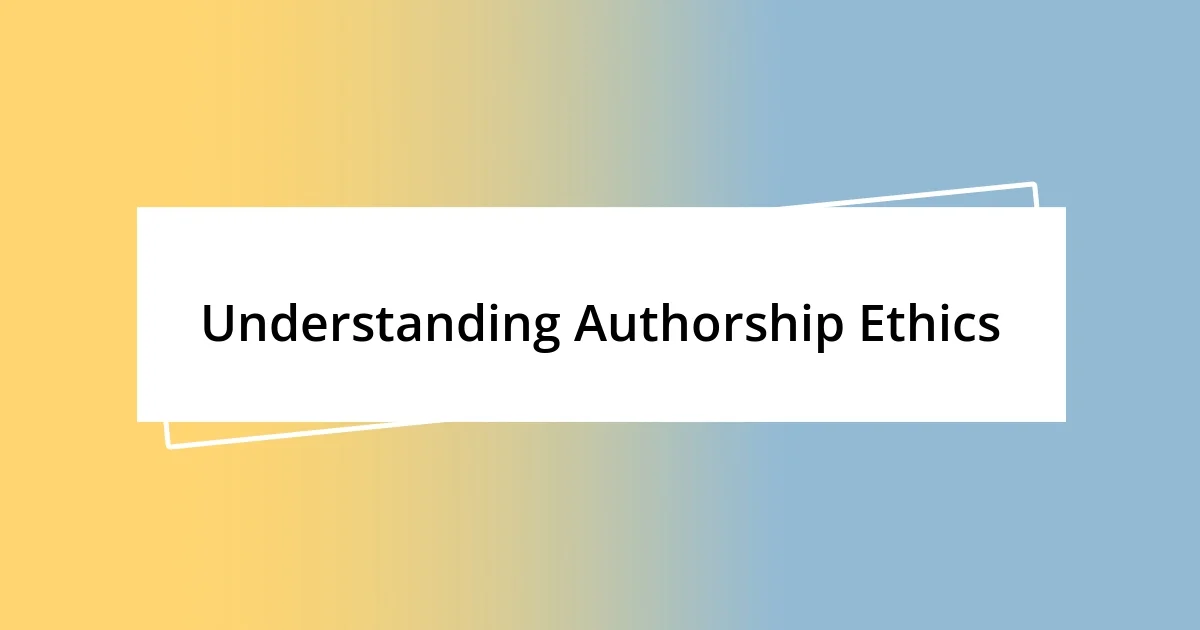
Understanding Authorship Ethics
Understanding authorship ethics is more than just a set of rules; it’s about integrity and respect in the collaborative process of creating knowledge. I remember when I first co-authored a paper. It felt exhilarating to see my name alongside seasoned researchers, but I also grappled with questions: Did I contribute enough? Was my role clearly defined? These moments made me acutely aware of the ethical obligations every author carries.
In academia, there’s often a grey area regarding who deserves authorship. I’ve encountered instances where contributors were overlooked simply because they weren’t in the spotlight during discussions. It made me realize how crucial transparent communication is in acknowledging everyone’s contributions. Have you ever felt sidelined for the hard work you put in? It’s a painful experience, but it underscores the need for open dialogue among all parties involved.
Moreover, the issue of ghostwriting raises further ethical dilemmas. I once had a conversation with a colleague who openly admitted to hiring someone to draft their manuscript. It left me pondering about the authenticity of one’s voice in published work. How do we balance the assistance we seek with the need to remain true to ourselves as authors? These dilemmas invite us to continuously reflect on our definitions of authorship and the principles that should guide our writing practices.
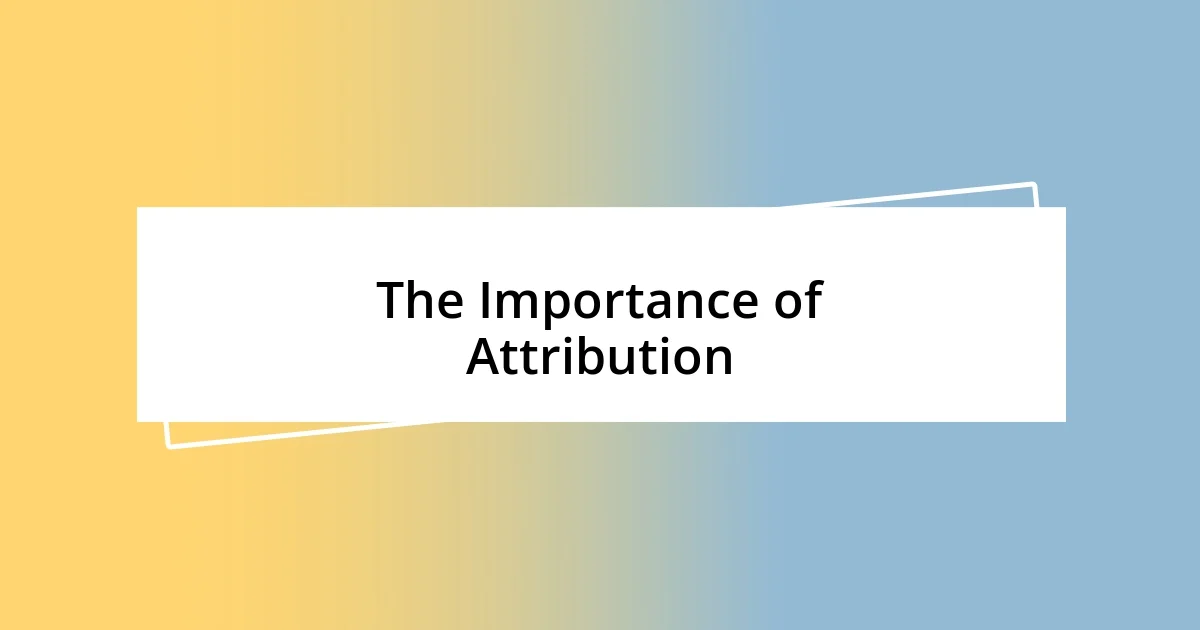
The Importance of Attribution
Attribution is the backbone of any scholarly work; it ensures that credit is given where it’s due. I remember the first time I read a research article with extensive citations. It struck me how a simple reference list could illuminate the hard work and ideas of others. Knowing that my contributions were recognized empowered me to continue pursuing my research with confidence.
Without proper attribution, we risk erasing the efforts of those who came before us. I recall a project where I had to write a section building off a colleague’s findings. If I hadn’t credited their work, it would have felt like stealing an idea, and the respect in our professional relationship would have dwindled. This experience taught me that acknowledging the work of others not only fosters trust but also nurtures collaborative environments that breed innovative ideas.
On the flip side, poor attribution can lead to serious consequences, including accusations of plagiarism. I once met a fellow researcher who faced such a situation purely because they neglected to cite a key source. It was a painful reminder of how easy it can be to misstep in the realm of authorship ethics. This incident reinforces for me the idea that solid attribution practices are not just about compliance; they’re about honoring the integrity of the scholarly community.
| Aspect | Importance of Attribution |
|---|---|
| Recognition | Ensures individuals receive credit for their contributions, motivating further research. |
| Trust | Fosters a collaborative environment, building professional relationships based on mutual respect. |
| Integrity | Maintains the authenticity of knowledge, protecting against plagiarism and ensuring ethical standards. |
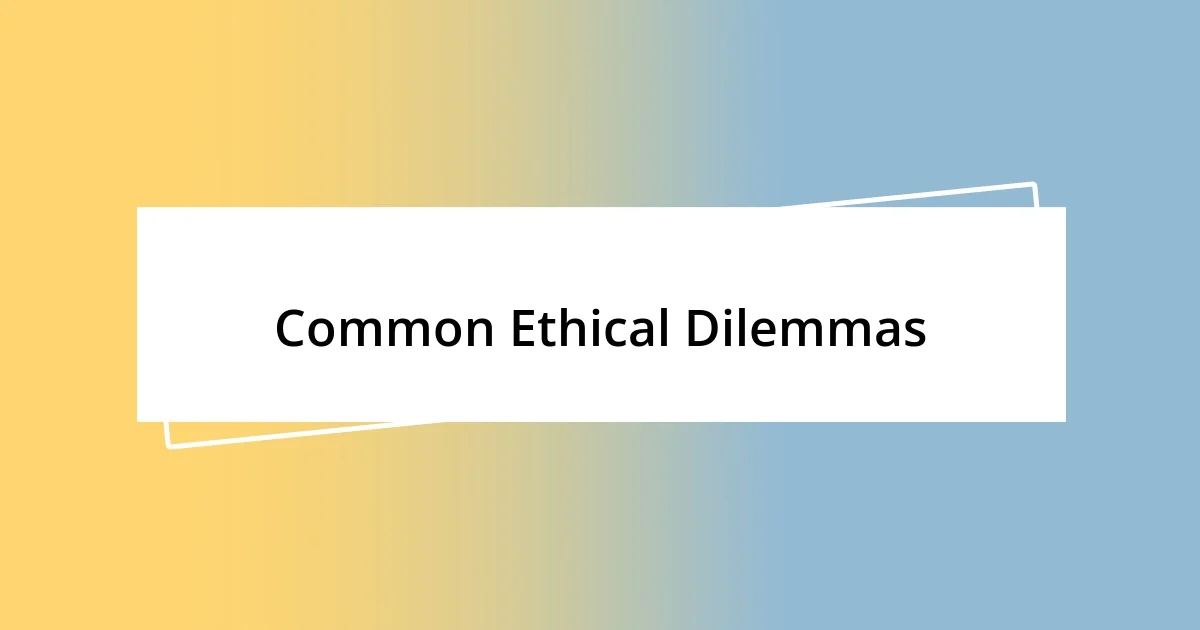
Common Ethical Dilemmas
When it comes to authorship, I’ve often witnessed the delicate dance of credit and responsibility. One particular project stands out in my mind. I was asked to co-author a paper, only to find out later that my contributions were not fully recognized in the final draft. It left me feeling undervalued and questioning whether I should have spoken up earlier. It illuminated the ethical dilemma of authorial equity—the balance between contribution and recognition.
Here are some common ethical dilemmas that frequently arise in authorship:
- Overlooking Contributions: It’s easy to miss a contributor’s vital role, especially when communication falters.
- Ghostwriting: Hiring someone to draft your manuscript can blur the lines of authenticity and self-representation.
- Authorship Order: Deciding who takes the lead author position can create tension if not discussed openly.
- Plagiarism: Failing to credit external ideas can lead to significant reputational damage and ethical breaches.
- Retraction of Work: The ethical implications of retracting published work often involve emotional and professional turmoil.
Reflecting on these dilemmas, I recall a time when I disagreed with a colleague over authorship order on a project. It was a tense discussion, filled with implications of both ego and merit. I realized that transparent dialogue not only resolves conflicts but also cultivates a deeper understanding of shared responsibility. Upholding authorship ethics requires ongoing reflection and communication, two elements I now prioritize in every collaborative effort.
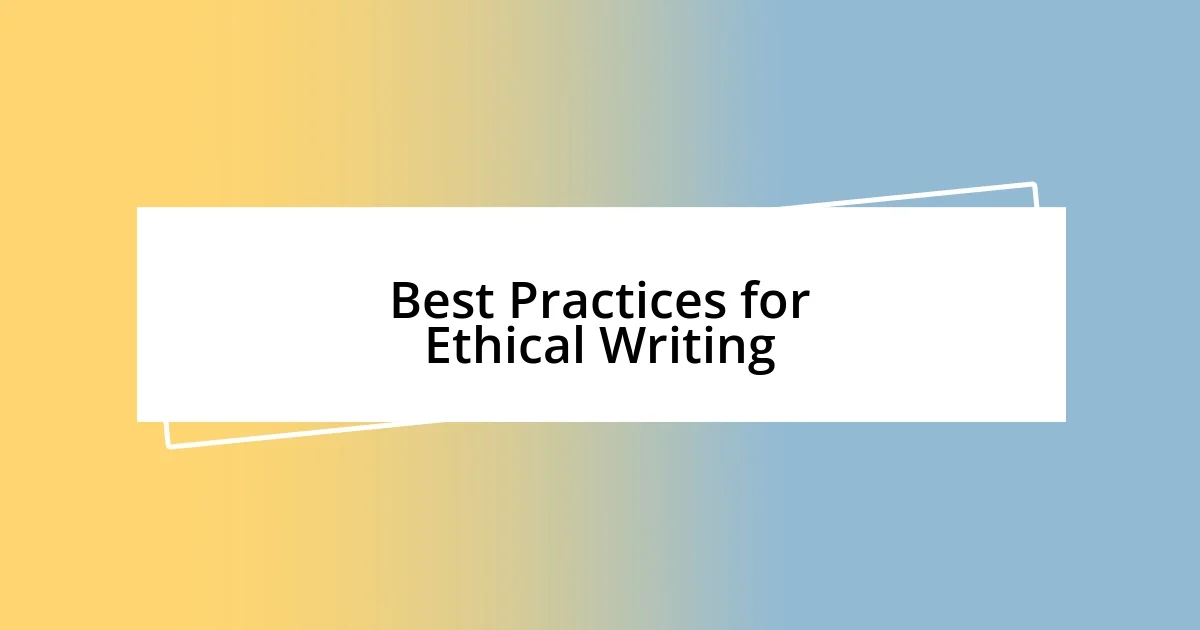
Best Practices for Ethical Writing
It’s essential to establish a clear communication channel among all contributors at the start of any project. I vividly recall a time when our team was in disarray because I assumed we all understood our respective roles without any formal agreement. The resulting confusion about who was responsible for what made collaboration incredibly frustrating. It reinforced for me the idea that discussing authorship specifics upfront can prevent miscommunications and foster an environment of mutual respect. Have you ever been a part of a project where expectations weren’t clearly set? I have, and it truly emphasized the importance of forward planning.
Another best practice involves regularly checking in on each other’s contributions throughout the writing process. During one collaborative article, I found myself pleasantly surprised by how sharing drafts and soliciting feedback rejuvenated not only our work but also our camaraderie. It’s tempting to run solo, but if you engage your co-authors early and often, you’re not just improving the quality of your writing; you’re also building trust and collaboration that last well beyond the publication date. Could there be a more rewarding outcome?
Lastly, I can’t stress enough the importance of embracing humility in the face of criticism. Once, after sharing a piece I was particularly proud of, I received some tough but constructive feedback from a colleague. At first, I felt defensive, but then I realized that a willingness to listen would only improve my work. This experience taught me that ethical writing goes beyond the act itself; it involves an openness to growth that can lead to more refined and impactful scholarship. How often do we let our work become our egos? For me, that realization was a pivotal moment in my writing journey.
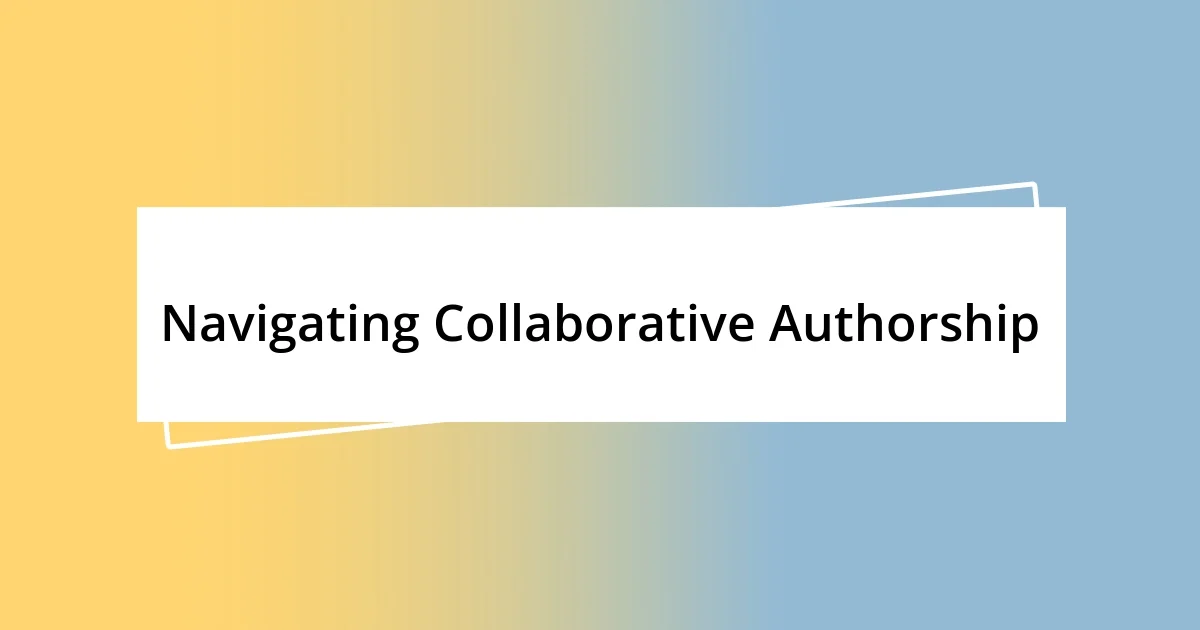
Navigating Collaborative Authorship
I vividly remember my first experience with collaborative authorship, where we were all excited to contribute, but soon faced unforeseen obstacles. One of the authors, who was particularly talented, took control of the writing process, and I felt my voice fading into the background. It made me wonder: how often do we let strong personalities overshadow quieter contributors in collaborative efforts? This power dynamic can be detrimental, not only to individual morale but also to the richness of the work itself.
During another project, someone proposed a novel approach that we hadn’t considered. I was initially skeptical, clinging to the convention we had established. However, after some open-minded discussions, we incorporated this new perspective, which ultimately elevated the entire piece. It struck me that navigating collaborative authorship demands flexibility and a willingness to embrace diverse ideas. Have you ever struggled with a similar situation, resisting change only to discover it improved the final outcome?
Moreover, I’ve learned that establishing authorship roles early on is crucial for maintaining harmony throughout the writing process. I remember a collaboration where we assigned roles randomly, leading to disputes about contributions later on. The lack of clarity stifled our creativity and created an atmosphere of mistrust. It begs the question: how can we foster an environment where everyone feels their contributions are valued? I’ve found that creating a shared document outlining our roles not only clarifies expectations but also builds a foundation of trust that enhances our collaboration.
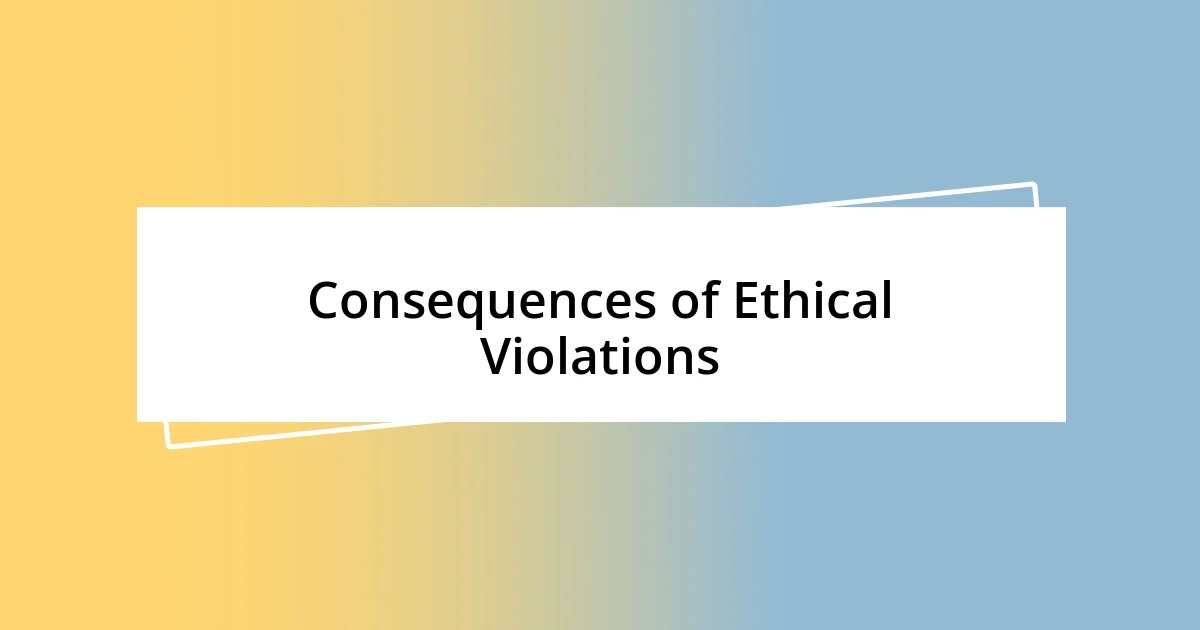
Consequences of Ethical Violations
Ethical violations in authorship can lead to severe academic repercussions. I recall a colleague who overstated their contribution to a paper, claiming credit for substantial sections they hadn’t written. The fallout was not just personal embarrassment—our institution’s academic integrity office became involved, sparking a lengthy investigation that tarnished everyone’s reputation. Isn’t it shocking how one act of dishonesty can ripple through an entire academic community?
In another situation, I witnessed a group dismiss overlooked ideas and sources that deserved credit. The downstream effects were significant. Those marginalized voices felt disheartened and excluded, which I believe stunted our project’s potential. It left me pondering: how often do we unintentionally silence valuable perspectives in our quest for recognition? I learned that incorporating every contributor’s insights not only enriches the work but also nurtures a culture of collaboration.
On a more personal note, I once grappled with the dilemma of not citing a source I had heavily relied on. Initially, I thought that no one would notice, but the gnawing guilt lingered. Ultimately, I chose to confront the issue and revised my piece to include proper credit. That experience reinforced my belief that ethical violations, no matter how seemingly small, can lead to a slippery slope of distrust and a loss of integrity in our scholarly pursuits. Have you ever faced a moment where doing the right thing seemed daunting? For me, it was a lesson in accountability that I still hold close today.
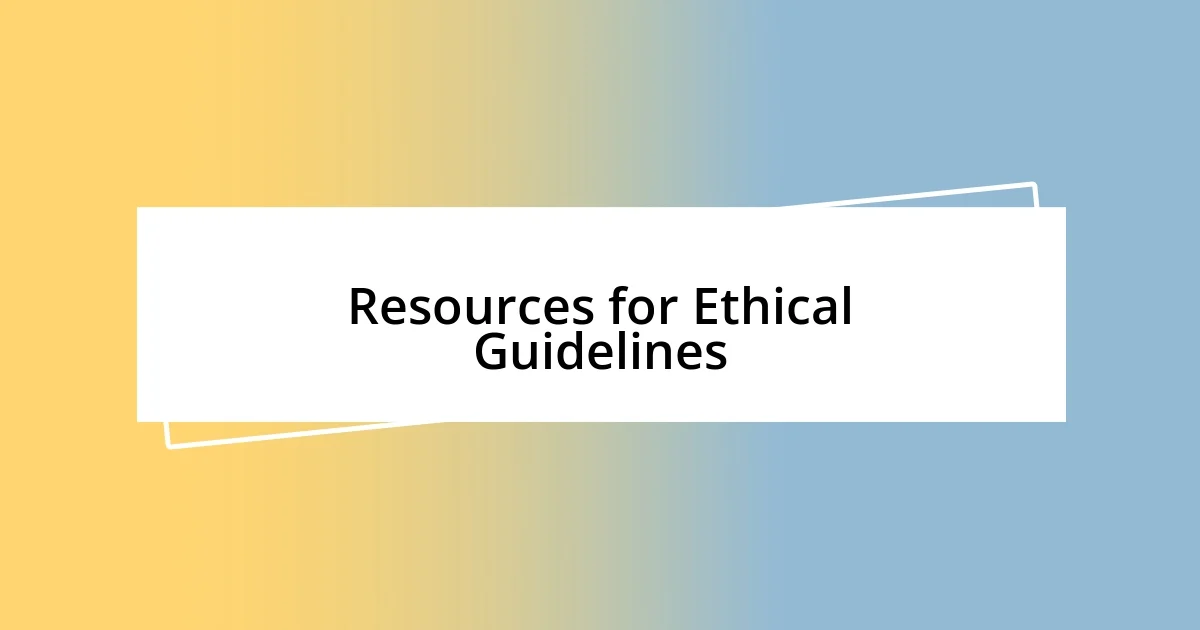
Resources for Ethical Guidelines
One of the best resources I’ve come across for ethical guidelines in authorship comes from the Committee on Publication Ethics (COPE). They provide clear frameworks and case studies that highlight the complexities of authorship ethics. I remember diving into their guidelines for authorship disputes during a particularly challenging project. It was like holding a roadmap that directed us toward fairness and accountability. Isn’t it empowering to have such resources at your fingertips when navigating these grey areas?
I also find that institutions often have their own ethics committees or resources. My university, for example, has crafted a comprehensive guide that merges legal and ethical considerations. These institutional resources can be invaluable, especially when you’re unsure about citation practices or collaboration etiquette. I recall reviewing that guideline before starting a project, which gave me the confidence to address ethical questions proactively. How often do we stop to check what our own institutions offer in terms of support?
Moreover, scholarly journals frequently publish articles focusing on ethics in authorship. I once stumbled upon a series of discussions in a well-respected journal that questioned the evolving standards of authorship. The insights shared not only sparked a thoughtful dialogue in my academic circle but also provided examples of ethical lapses and lessons learned from them. Don’t you think it’s fascinating how we can learn from the experiences of others, making our own practices stronger? These resources have shaped my understanding and appreciation for ethical authorship, highlighting how learning from our community can lead to more responsible writing practices.


